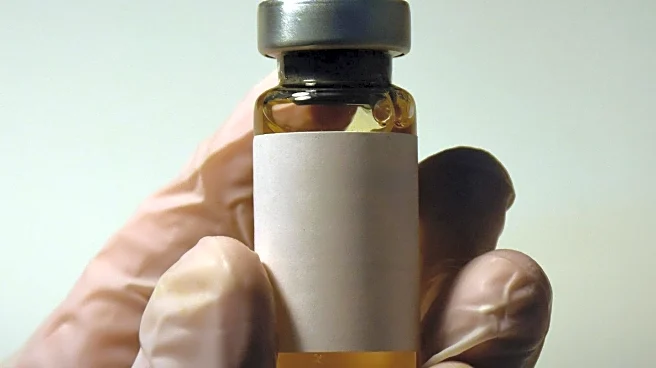What's Happening?
Researchers at Chiba University have developed a promising intranasal nanogel vaccine aimed at treating cervical cancer caused by human papillomavirus (HPV). The study, led by associate professor Rika Nakahashi-Ouchida and Hiromi Mori, was published in Science
Translational Medicine. The vaccine utilizes cationic cholesteryl-group-bearing nanogels (cCHP) to deliver HPV antigens directly to the nasal mucosa, targeting the E7 oncoprotein produced by HPV16. This approach aims to activate local immune responses and slow tumor growth, as demonstrated in preclinical models involving mice and macaques. The vaccine formulation, cCHP-E7 + c-di-AMP, showed significant efficacy in inducing E7-specific T cells and slowing tumor progression, offering a non-invasive alternative to conventional treatments like surgery and chemotherapy.
Why It's Important?
Cervical cancer is a major global health issue, particularly affecting women in low- and middle-income countries where access to HPV vaccination and treatment is limited. The development of a therapeutic vaccine that can treat existing HPV infections and associated cancers represents a significant advancement in medical science. This intranasal vaccine could potentially preserve fertility and improve the quality of life for patients by providing a non-invasive treatment option. The research highlights the potential for nanogel-based vaccines to reshape cervical cancer treatment, offering safer and more accessible options for patients worldwide.
What's Next?
Further clinical testing is essential to validate the efficacy and safety of the intranasal nanogel vaccine in humans. If successful, this approach could lead to the establishment of a new category of non-invasive treatments for HPV-driven cancers. The research team at Chiba University aims to expand the role of immunotherapy beyond prevention, potentially extending these methods to recurrence prevention and chronic disease management. The findings open the door to a new generation of mucosal-targeted vaccines, which could significantly impact global health strategies against cervical cancer.
Beyond the Headlines
The development of this vaccine underscores the importance of innovative delivery methods in immunotherapy. By targeting the respiratory-reproductive axis, the vaccine stimulates mucosal immunity in the reproductive tract, a concept previously demonstrated in herpes simplex virus models. This approach not only offers a potential treatment for cervical cancer but also highlights the broader implications for treating other mucosal infections and diseases. The research could pave the way for new therapeutic strategies that prioritize patient quality of life and accessibility.














